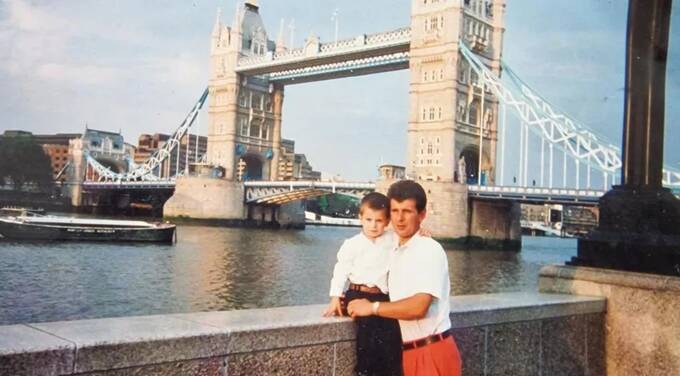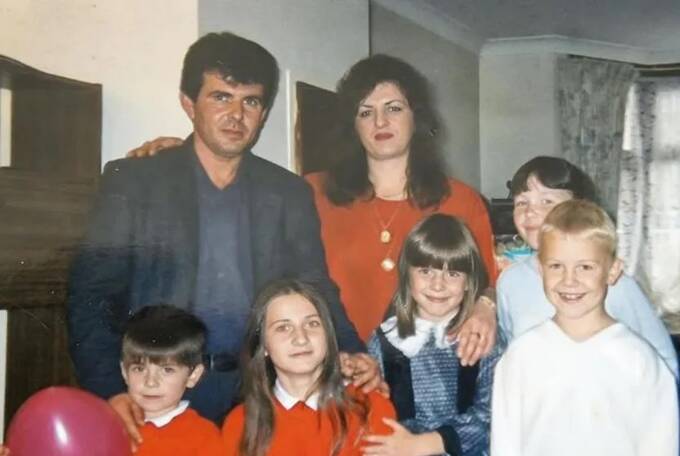Family of british man arrested in Serbia appeals for government help

The family of a British man held in a Serbian prison is appealing for more assistance from the UK government, claiming that charges against him are baseless and politically motivated.
Sadik Duraku, a 54-year-old father of three from Brighton, was arrested on April 17 2024 while travelling to visit relatives in Kosovo.
He is currently being held in a Belgrade prison, accused of committing war crimes as a member of the Kosovo Liberation Army (KLA) in the 1990s - allegations his family and legal team deny.
The UK Foreign, Commonwealth and Development Office (FCDO) said: “We are supporting a British man detained in Serbia and are in contact with the local authorities.”
Mr Duraku was born in Kosovo - which at the time was part of Yugoslavia.
In 1998, he and his family were granted asylum in the United Kingdom while war raged in his home country.
He became a British citizen in 2002, and built a life running a car washing business before retiring due to ill health.
The arrest
In April, Mr Duraku was arrested while crossing the Serbian-Hungarian border - a trip he had done many times before.
This time, he was detained by Serbian border police and charged with war crimes allegedly carried out as a member of the KLA.
That same day, over 1,000 others were detained by Serbian authorities, but only a small number were eventually charged.
The initial allegations against Mr Duraku accused him of participating in war crimes against the local population in 1999.
His family is adamant these charges are unsubstantiated and say he was never involved with the war at all, was not a member of the KLA, and did not take part in any violence.
"We were gobsmacked," said Zana Duraku, his daughter.
The family has collected extensive documentation in order to prove that he was in the United Kingdom and did not hold the necessary paperwork required to leave the country from December 1998 until he gained citizenship in 2002.
The letter
Mr Duraku’s UK-based lawyer, Michael Polak from Justice Abroad, said the entire case rests mostly on a letter.
Purportedly from a Serbian individual "supposed to live in Germany", that letter is attributed to someone who "doesn’t appear to be a real person" said Mr Polak.
He said the letter does not appear to be from a real address and contains calls to "torture" Mr Duraku until "the truth comes out of him".
Mr Polak claims that "it is very unusual to base a case for a crime as serious as war crimes on this kind of document”.
War crime cases usually “have folders and folders and folders of evidence about movements and actions," he said.
The lawyer alleges the letter has either “been concocted for these proceedings or potentially put together by someone with a grudge against" Mr Duraku.
"This is a war crimes accusation based on this really flimsy evidence of this letter," he added.
"This is someone with health problems, someone who should be released on bail to go back to the United Kingdom."
Regional tensions
Mr Polak said it was "difficult to say" what the motivations in the case were.
Tensions between Kosovo and Serbia remain high, despite the war ending in 1999.
Serbian President Aleksandar Vučić has repeatedly vowed that Serbia will never recognise Kosovo as an independent nation.
The government of Kosovo wants to assert authority over all of Kosovo, but ethnic Serbs living in the northern region, bordering Serbia, are resisting this move, demanding greater autonomy.
The Serbian Public Prosecutor’s Office for War Crimes did not respond to the BBC’s request for comment.
In its National Strategy for War Crimes Prosecution, the Serbian government states that Serbia “effectively demonstrates adequate investigations of allegations and equal treatment of suspects” and that “efficient war crimes trials” are an “inseparable part of the rule of law and a feature of democratic societies”.
Stefan Jovanovic, from the Center for International Relations and Sustainable Development, a Belgrade-based think-tank, defended the Serbian handling of war crimes cases saying the country has "huge experience" of them and he expected Mr Duraku to get a fair trial.
Regional tensions
Mr Polak said it was "difficult to say" what the motivations in the case were.
Tensions between Kosovo and Serbia remain high, despite the war ending in 1999.
Serbian President Aleksandar Vučić has repeatedly vowed that Serbia will never recognise Kosovo as an independent nation.
The government of Kosovo wants to assert authority over all of Kosovo, but ethnic Serbs living in the northern region, bordering Serbia, are resisting this move, demanding greater autonomy.
The Serbian Public Prosecutor’s Office for War Crimes did not respond to the BBC’s request for comment.
In its National Strategy for War Crimes Prosecution, the Serbian government states that Serbia “effectively demonstrates adequate investigations of allegations and equal treatment of suspects” and that “efficient war crimes trials” are an “inseparable part of the rule of law and a feature of democratic societies”.
Stefan Jovanovic, from the Center for International Relations and Sustainable Development, a Belgrade-based think-tank, defended the Serbian handling of war crimes cases saying the country has "huge experience" of them and he expected Mr Duraku to get a fair trial
’It’s tearing us apart’
Under Serbian law, a defendant in Mr Duraku’s situation can be held for six months while the prosecution builds their case and decides whether to proceed with a trial.
The family’s fears and concerns are further exacerbated by Mr Duraku’s fragile health.
He recently had a heart attack and requires prescription medication, which his family have delivered to him on prison visits to Belgrade.
Ms Duraku says that the stress of his detention is taking a severe toll on him. "He’s getting so, so low and so scared," she said.
She added: “It’s tearing us apart as we’re all so devastated. There’s not a point in the day where you’re not stressed about it."
The family feels that the UK government has not done enough to intervene.
"He’s British, and so we thought that our government would protect his rights and would be looking after him, but it hasn’t, and we’re just endlessly disappointed at every turn," said Ms Duraku.
The FCDO told the BBC that it was providing assistance to Mr Duraku and it was in contact with his family.
It also said that FCDO officials had visited Mr Duraku in detention.
Additional reporting by Tamara Kovacevic.
Read more similar news:
Comments:
comments powered by Disqus



































